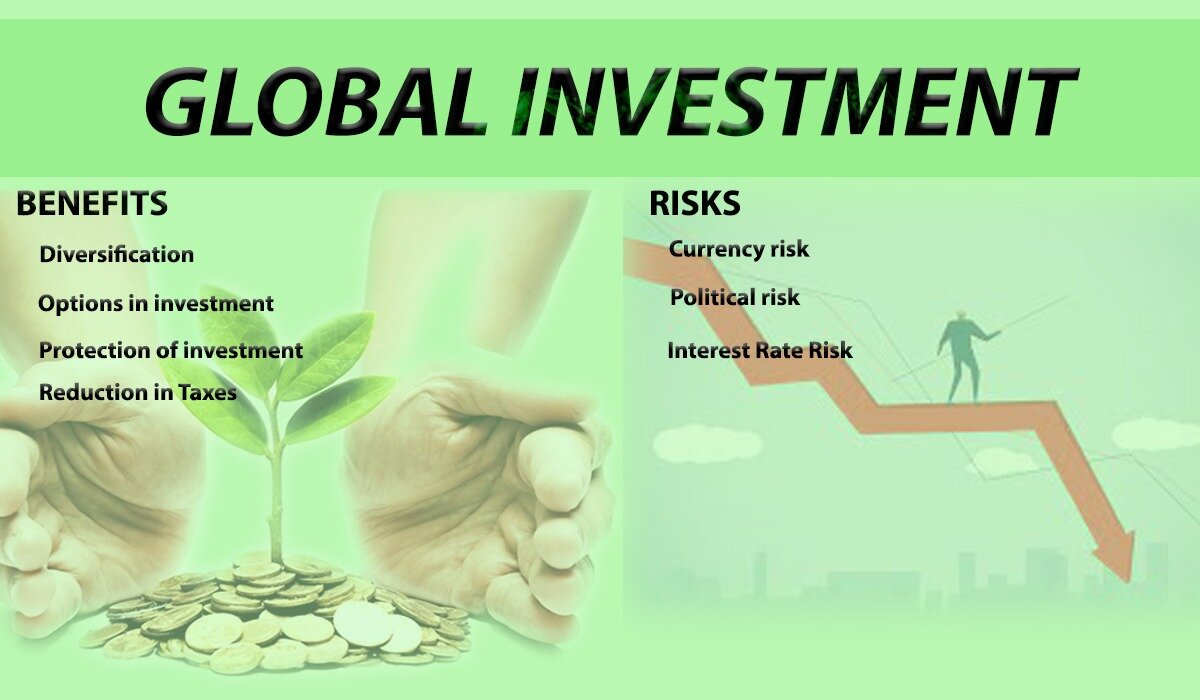As U.S. firms' share of global sales and profit declines, investing abroad has taken on more significance. In April 2022, U.S.-listed domestic stocks constituted roughly 42 percent of global market capitalization. Top mutual fund companies often advise investors to invest around 40% of their portfolios in equities from outside the United States. In this piece, we'll assess whether or not the potential rewards of becoming global are worth the potential dangers.
What Is International Investment Risk?
The phrase "global investment risk" is quite inclusive, including a wide range of foreign dangers, such as those associated with fluctuating currencies, unstable governments, and high-interest rates. Before putting their money into global markets, international investors should weigh the pros and downsides of these potential dangers.
Types of Investment Risks
Increased Transaction Costs
The additional transaction expense is the main obstacle to investing in international markets, and it differs from one foreign market to another. WinVista provides discount brokerage fees (even lower than those for investing at home) with no commissions for trading on U.S. marketplaces. Access might not be that cheap for numerous other markets. In addition to brokerage fees, you should be aware of any other expenditures, such as F.X. conversion costs, transaction fees, and yearly maintenance fees.
Currency Fluctuations
When making direct investments abroad, you must first exchange your native currency into another currency at the going rate. Consider selling a foreign stock you've owned for a year. In the end, the money is changed back into Indian rupees. Based on the direction of the local currency, it might boost or lower your return.
Political Risk
A country's geopolitical climate is another factor to think about before investing there. Internal market volatility may be triggered by political events that influence the country's domestic economy. Not even the most well-known businesses are safe from the wrath of governments and policymakers in emerging economies. States like Mexico and Brazil are particularly prone to this problem.
The Advantages of Global Investing

Diversification
The most apparent and fundamental advantage of global investment is diversification. In times of market uncertainty, a portfolio that has been properly diversified might provide relief. The connection between your investments decreases as you diversify them across different regions. This implies that your other holdings are relatively immune to the effects of market volatility. It's worth noting that many US-listed firms have international sales. Over forty percent of S&P 500 firms' sales are generated from markets outside the United States. It is possible to create a diverse portfolio with holdings in the United States alone.
Numerous Options for Investment
Investing internationally opens the door to possibilities that aren't available locally. If you want to invest in the biggest technology businesses in the world, you won't find them in India. If you like, you may choose a specific topic or combine many different industries. You may favor the U.S. marketplace for high-tech goods, the European market for high-end engineering, and the Australian market for basic necessities. There are multiple opportunities in the medical and pharmaceutical industries in the United States and Europe. ETFs provide exposure to a wide range of global markets. The EWG exchange-traded fund (ETF) is a US-listed option for investing in German stocks, while the EWZ ETF provides access to the Brazilian market.
Investment Protection
Investing around the world also protects investments from fraud and liquidations, which is a big plus. Companies operating in developed markets are often subject to stringent rules that guarantee good corporate governance and heavy penalties for those who abuse the market. This safeguards the common investor from fraud and the risks of insider trading. Keep in mind that money is always at stake, but that many international financial institutions provide insurance against seizure and other risks like broker-dealer liquidation. In the United States, for instance, the Securities Investor Protection Corporation (SIPC) will cover your assets up to $500,000 in the event that your broker-dealer goes bankrupt.
Currency Diversification
The risk of a rising foreign currency is inherent in every overseas investment (or depreciation). For instance, in recent years, the U.S. dollar has gained around 5% on average against the Indian rupee. Over the course of the long run, the currencies of emerging economies tend to devalue. The average interest rate offered by local savings accounts is just between three and four percent. Portfolios that diversify their holdings internationally have often benefited from rising currency values and improved market conditions.
Are Global Investments Risk-Worthy?

Long-term portfolio volatility is reduced by global diversification. Investors might get exposure to the region's market that is doing well in the near term. While the United States may have the highest rates of return at times, this is not always the case. During the mid-1980s, for instance, a diversified portfolio that included exposure to non-U.S. stocks would have beaten a domestic-only one. The fact that currency fluctuations are uncorrelated with equities performance suggests they might contribute to diversification. A decreased reliance on U.S. stock markets might provide investors with more consistent long-term returns.
Conclusion
To effectively diversify one's investment portfolio, international investment is now a need. Although there is potential for financial gain, you should also be aware of the potential drawbacks. You may find a wealth of resources online to help you assess potential losses and make smart decisions about your investment portfolio. Before considering any investment, you may want to talk to a financial professional.




